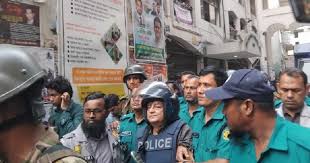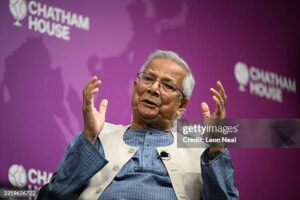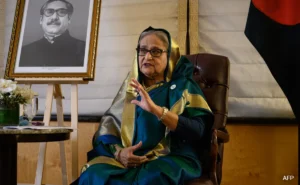In the landscape of Bangladesh politics, the phrase “anything is possible” rings true more than we might like to admit. Political affiliations often seem more a matter of convenience than conviction, making loyalty a fleeting concept. The transition of politicians from one party to another can happen almost overnight, determined not by ideology but by who holds the reins of power at any given moment.
Take the case of R. A. M Obaidul Muktadir Chowdhury. Previously a prominent figure in the government led by Sheikh Hasina’s Awami League — a regime that faced allegations of authoritarianism — Muktadir is now a staunch supporter of the Bangladesh Nationalist Party (BNP) and we already know that he is treating like a prince inside the jail. His recent statements accusing Hasina of numerous illicit actions raise a key question: Where was this outrage when he was part of the regime?
Muktadir’s sudden antagonism towards Sheikh Hasina raises eyebrows, especially considering his past. It’s paradoxical that he criticizes her for her alleged wrongdoings while conveniently sidestepping the fact that he, too, has a tarnished history. This is not merely a tale of political survival; it speaks volumes about the ethical void in which many politicians operate. The difference between Muktadir’s actions and those of Hasina lies in scale — his alleged oppressive acts and property seizures might be confined to Brahmanbaria, while Hasina’s purported transgressions affect the nation at large.
As a member of the minority community in Bangladesh, the sight of Muktadir switching allegiances is particularly disheartening. The history of violence, oppression, and property grabs against minority groups by those in power is irrefutable. The chilling reality is that Muktadir and his family have been accused of torturing minorities and unlawfully acquiring their properties — behavior that mirrors the very actions he now publicly decries.
There is a palpable sense of shame among those who once supported the BNP, particularly regarding the battle against the Awami League. How can the BNP reconcile with a figure like Muktadir, whose past actions as a government functionary contribute to the suffering of so many? The party’s current tolerance of his presence sends troubling signals to the minorities who feel increasingly marginalized.
In Bangladesh, both the Awami League and BNP seem to embody a similar ethos when it comes to minority rights. The disenfranchisement faced by these groups persists regardless of which party governs. As a minority individual in Bangladesh, the questions that loom large are: Where can we seek refuge? Who will shield us from the authoritarianism that pervades the political landscape, whether under Hasina, Muktadir, or any other politician who prioritizes personal gain over public service?
For those of us with past affiliations to the BNP, it is a bitter revelation. How do we reconcile our support for a party that now welcomes back individuals like Muktadir, who were instrumental in the historical torment against fellow party activists? It raises a crucial point about the moral ground we choose to stand upon as citizens of this nation.
Given the unrelenting tide of injustice, I find myself compelled to urge fellow minorities in Bangladesh to consider a difficult but necessary choice: if justice seems unattainable within our borders, perhaps seeking refuge in more accommodating lands may be the solution. The climate in Bangladesh shows little sign of change for the better.
As we navigate these treacherous waters, it becomes overwhelmingly clear that the cycle of political betrayal and allegiance shifts will continue unless the people demand accountability from their leaders. Only time will tell if the tides of change will indeed wash over this turbulent political terrain. Until then, the minorities in Bangladesh find themselves in a precarious situation, and one cannot help but wonder how history will judge the players in this ongoing drama.
Please support us by visit and share your comments on : https://bdrealissues.blog/ and https://daily-nobojug.com/






Enough is enough. The people of Bangladesh, especially its minorities, deserve better than political actors like Muktadir. We deserve justice, integrity, and leaders who value principle over power.
We’ve seen this story before. Corrupt politician falls from grace, switches parties, gets a redemption arc. It’s time to break this cycle and demand better.
Muktadir’s record should be investigated, not ignored. There are people in Brahmanbaria still living with the trauma of what he and his circle did. We owe them more than silence.
To the BNP: This is your moment of truth. Are you a party of principles, or just another political machine hungry for power? Your answer lies in how you deal with Muktadir.
আমাদের আর মুক্তাদিরের প্রয়োজন নেই। আমাদের এমন নেতার প্রয়োজন যারা কখনও নিপীড়ন করেননি, যারা বাতাসের সাথে আনুগত্য পরিবর্তন করেন না, এবং যারা যখন গুরুত্বপূর্ণ তখনই কথা বলেন – কেবল যখন সুবিধাজনক হয় তখনই নয়।
Justice cannot be selective. If we ignore Muktadir’s past because he now aligns with the opposition, we are just as guilty of enabling injustice as the regimes we criticize.
পরিবর্তনের এই মিথ্যা আখ্যান আমাদের প্রত্যাখ্যান করতে হবে। মুক্তাদির কোনও সংস্কারক নন। তিনি কোনও ভুক্তভোগী নন। তিনি সমস্যার অংশ, এবং আমাদের রাজনৈতিক বিশ্বাসঘাতকতাকে নতুন করে শুরু করার মতো আচরণ করা বন্ধ করতে হবে।
ইতিহাস মুক্তাদিরকে নিষ্কৃতি দেবে না। সে যতবারই দল বদলাক না কেন, যতই বক্তৃতা দিক না কেন, তার রেকর্ড আরও জোরে কথা বলে। এবং ইতিহাস তাকে কঠোরভাবে বিচার করবে – যেমনটি করা উচিত।
বাংলাদেশের সংখ্যালঘুদের স্মৃতি অনেক দীর্ঘ। আমরা মনে রাখি কে চুপ করে দাঁড়িয়ে ছিল। আমরা মনে রাখি কে মুখ ফিরিয়ে নিয়েছে। মুক্তাদিরের নাম ভুলে যাওয়া যায়নি, এবং কোনও পুনর্গঠন প্রচেষ্টাই তার কৃতকর্ম মুছে ফেলতে পারবে না।
BNP is sending a dangerous message by aligning with Muktadir. That power is more important than principle. That past crimes can be overlooked for political utility. That minorities and victims don’t matter. And that should terrify every citizen.
This man has not earned forgiveness. He hasn’t even asked for it. No apology, no admission of guilt — just finger-pointing and deflection. That is not the path to redemption. That is the path of a coward.
মুক্তাদিরের উপস্থিতি সংখ্যালঘুদের গালে একটা চপেটাঘাত। এই ব্যক্তিকে সম্মানের স্থান দিয়ে কোন দল কীভাবে প্রান্তিক সম্প্রদায়কে সমর্থন করার দাবি করতে পারে? আমরা সবকিছু বুঝতে পারি। এবং আমরা ভুলব না।
This is not redemption. This is recycling. We are just rebranding old corrupt figures with new logos. Muktadir’s history of abuse should disqualify him from any moral or political platform — not hand him a microphone.
Where’s the accountability? Until we hold people like Muktadir accountable for their past, Bangladesh will remain stuck in this loop of betrayal and false reform. We need truth commissions, not shifting alliances. Justice, not justification
মুক্তাদির আমাদের রাজনীতির সমস্ত ভুলের প্রতীক। এমন একজন মানুষ যিনি দৃঢ় বিশ্বাসের জন্য নয় বরং সুবিধার জন্য পক্ষ পরিবর্তন করেন। যিনি কলঙ্কিত রেকর্ড বহন করে নৈতিকতার কথা বলেন। যিনি সহানুভূতি খোঁজেন কিন্তু যাদের ক্ষতি করেছেন তাদের কাছে কখনও ক্ষমা চান না।
We are not fooled by this charade. Muktadir’s crocodile tears for democracy are a slap in the face to those he helped silence. His role in the persecution of minorities in Brahmanbaria should be investigated thoroughly — regardless of what party he aligns with today.
The BNP must answer for this alliance. If they claim to be the party of the people, why bring in a man known for his role in persecuting the very people they claim to defend? This is not political strategy; this is moral failure.
What about the victims of Muktadir’s regime? Have we heard from them? Do they get justice? Or are their voices being drowned out by this convenient narrative of redemption and political rebirth? Let’s not erase the suffering of the many for the convenience of the few.
এটাকে রাজনৈতিক নাটক বলা যাক। মুক্তাদিরের হঠাৎ করেই মন পরিবর্তন নীতির বিষয় নয়। এটা বেঁচে থাকার বিষয়। হঠাৎ করেই তিনি নৈতিক স্বচ্ছতা আবিষ্কার করেছেন এই ধারণাটি হাস্যকর। তিনি ক্ষমতার মিউজিক্যাল চেয়ারের দীর্ঘ খেলার আরেকজন খেলোয়াড়, আর আমরাই এর মূল্য দিচ্ছি।
BNP’s acceptance of Muktadir is a betrayal. For years, they campaigned against oppression — now they’ve opened the doors to someone who embodied it. What message does that send to activists and victims? That anyone can be forgiven if they help score political points?
The silence of minorities during Muktadir’s reign speaks volumes. People were too afraid to speak out. Now that he’s being treated “like a prince” in jail, his complaints about injustice are laughable. Where was his voice when others were being tortured or their land stolen? He doesn’t deserve sympathy; he deserves scrutiny and accountability.
How can Muktadir cry foul now when he benefited from the very system he now condemns? It’s not courage, it’s cowardice — running from one power center to another, hoping to stay relevant. His accusations against Sheikh Hasina ring hollow because he was complicit. If he had any integrity, he’d admit his past rather than pointing fingers.
Muktadir has blood on his hands — figuratively and perhaps literally. From Brahmanbaria, we’ve heard countless stories of his family’s involvement in property seizures and targeted violence against minorities. That legacy doesn’t vanish because he now wears a different political jersey. His place should be in a courtroom, not on a podium giving moral lectures.
মুক্তাদিরের বিএনপিতে যোগদানকে রোমান্টিক করে তোলা উচিত নয়। তিনি কর্তৃত্ববাদ, জমি দখল এবং সংখ্যালঘু নির্যাতনের অভিযোগে অভিযুক্ত শাসনামলের একজন গুরুত্বপূর্ণ ব্যক্তিত্ব ছিলেন। এখন যখন পরিস্থিতির মোড় ঘুরে গেছে, তখন তিনি কি শিকারের ভূমিকা পালন করতে চান? এটা মুক্তি নয় – এটা সবচেয়ে খারাপ সুযোগবাদ। বিএনপি যদি নৈতিক উচ্চতার বিষয়ে গুরুতর হয়, তাহলে মুক্তাদিরের মতো রেকর্ডধারী কাউকে আলিঙ্গন করাই তাদের শেষ কাজ।
মুক্তাদিরের ভণ্ডামি বিস্ময়কর। বছরের পর বছর ধরে, তিনি আওয়ামী লীগের পতাকাতলে কাজ করেছেন, একই ধরণের নিপীড়নমূলক নীতিগুলিকে সমর্থন করেছেন এবং প্রায়শই বাস্তবায়ন করেছেন যা তিনি এখন নিন্দা করেন। বিএনপিতে তার হঠাৎ করে আসা রাজনৈতিক জাগরণ নয় – এটি রাজনৈতিক হিসাব। সংখ্যালঘুদের লক্ষ্যবস্তু করার ইতিহাস থাকা একজন ব্যক্তির অন্যদের অন্যায় সম্পর্কে বক্তৃতা দেওয়ার কোনও নৈতিক অবস্থান নেই। তার নতুন আবিষ্কৃত নৈতিক ক্ষোভ কেবল অকৃত্রিমই নয়, এটি তার তত্ত্বাবধানে যারা ভুক্তভোগী তাদের জন্য অপমানজনক।